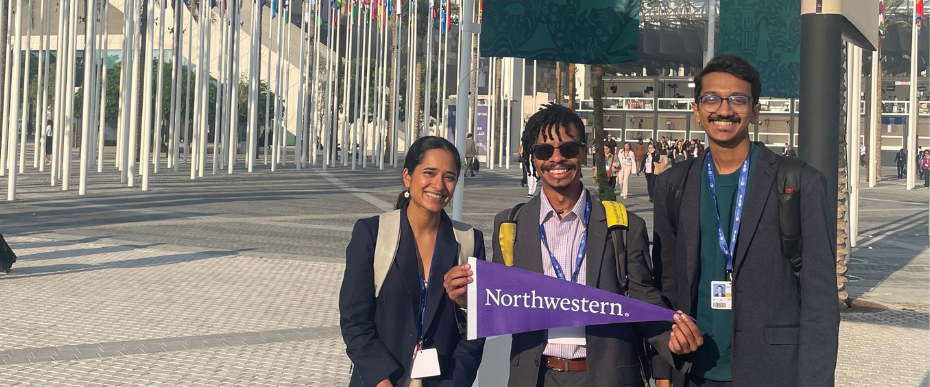Student Research Opportunity at the United Nations' Climate Change Conference

Are you a Northwestern student interested in climate change or global environmental governance? Would you like to attend the Conference of the Parties (COP) to the United Nations Framework Convention on Climate Change?
How do international climate negotiations work? Who participates, and what motivates the parties involved? What are their points of agreement and disagreement? Under what conditions can global climate governance be effective?
This POLI_SCI 390 course, taught by Professor Iza Ding, provides students with foundational knowledge of global climate governance and offers an immersive experience at COP—the Conference of Parties to the United Nations Framework Convention on Climate Change (UNFCCC), taking place in Türkiye in November 2026. Students will gain firsthand insights into the negotiation processes and dynamics shaping global climate policy. Students will also complete an original research project, either individually or collaboratively.
Students who have attended the COP say the experience is transformative. Read the COP29 delegation’s daily reflections and takeaways.
Annual application deadline: April 15
The application window will open in early March.
The following Northwestern University students are eligible to apply:
- Undergraduates who will be juniors or seniors during the fall quarter for which they are applying to take this research seminar
- Graduate students interested in conducting research on climate change conferences from different disciplinary backgrounds
The number of observer badges available for Northwestern delegates to the COP is uncertain until they are allocated by the UNFCCC in the fall. Therefore, admission to the course is not a guarantee for travel or for an observer badge to the UNFCCC meetings for a specific number of days.
In addition to capacity limits, access to the venue can be impacted by international or local politics as well as health and security factors. Thus, while we make every effort to enable students to attend COP, we are unable to guarantee access.
In the case that students are unable to travel, they will serve as a virtual delegate.
If accepted to travel:
- Student delegates typically travel for one week of the COP. We aim to share badges amongst the delegation and encourage engagement in the public areas of the COP as well.
- Accepted students are responsible for requesting permission from their professor(s) to be absent from courses that may overlap with these travel dates. This approval will be at the discretion of the professor(s). Undergraduate students are encouraged to speak with their academic advisor. The Roberta Buffett Institute can provide documentation of the trip.
The following expenses will be covered for students who are selected to travel to the COP:
- Round-trip group flight
- Shared lodging
- International medical insurance and assistance program with BCBS Global Solutions (formerly GeoBlue)
Students are responsible for all other expenses, such as meals, incidentals, entertainment, travel upgrades and extensions, in-country transportation, and visa costs. In recent years, the COPs have created a process for a no-cost visa and no-cost travel to the conference site from popular hotel areas.
Spending habits can vary greatly by individual. We encourage applicants to research these costs in advance, though we generally expect expenses to be less than $600 for a one-week trip. Previous students have secured supplemental funding from their department, school or an external organization to meet this cost.
Students must apply by April 15. You may view a PDF of the application before applying.
The application review process may include an interview with the instructor. We aim to notify applicants in early May, before the fall quarter pre-registration period.
The applications will be assessed using the following criteria, with additional consideration of the cohort dynamics.
- The extent to which this experience deepens or advances the student’s research and learning objectives
- Previous experience working in collaborative teams within or outside of a research setting
- Demonstrated interest in climate change, environmental issues, or policy
Questions should be directed to Samantha Nissen, Director for Strategic Initiatives & Undergraduate Programs at the Roberta Buffett Institute. The Institute typically hosts an information session in the spring. Subscribe to our mailing list to receive reminders about program deadlines and information sessions.
